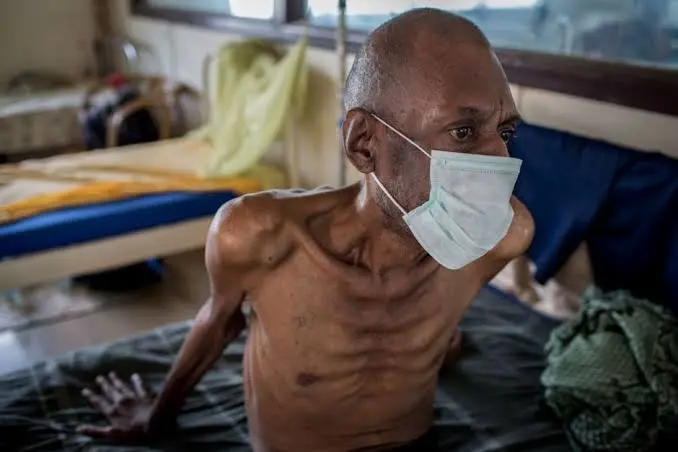Author's details
- Hakim A Abubakre
- BA (Hons) International Business Management, M.Sc. Digital Marketing.
Reviewer's details
- Dr. Khashau Eleburuike
- MBBS (Ilorin) MSc. Global Health Karolinska Institute.
- Resident doctor in family medicine in Northen Sweden.

- Date Published: 2025-05-09
- Date Updated: 2026-01-02
Tuberculosis (TB) in Sub-Saharan Africa
Key Messages
- Tuberculosis (TB) is a serious but treatable infection that mainly affects the lungs but can also impact other organs.
- There are two types of TB: inactive (latent) TB, which is not contagious, and active TB, which can spread to others and causes symptoms.
- Children, especially those under 5, are at higher risk for severe TB and can become very sick quickly.
- Completing the full course of TB medication and following self-care guidelines are essential for recovery and preventing the spread of TB.
- Prevention includes vaccination, early diagnosis and treatment, community awareness, good ventilation, and maintaining a strong immune system.
What is Tuberculosis (TB)?
Tuberculosis, commonly called TB, is an infection caused by a type of bacteria known as Mycobacterium tuberculosis. It mostly affects the lungs, but can also attack other parts of the body like the brain, kidneys, or spine. Sometimes, TB can even infect more than one part of the body at the same time, such as the lungs and lymph nodes.
There are two types of TB:
Inactive (latent) TB: You have the TB germs in your body, but you don’t feel sick, don’t have any symptoms, and cannot pass the disease to others.
Active TB disease: This is when the TB germs are active and growing, making you feel sick. If you have active TB, you can spread it to other people when you cough, sneeze, or talk.
Children, especially those younger than 5 years, are more at risk of developing active TB faster than adults. Young children and babies can get very sick, especially with dangerous forms of TB like TB of the brain (TB meningitis).
Without treatment, TB can be deadly. However, TB can be treated with medicine, and it is important to follow the doctor’s instructions.
Symptoms vary based on age, but here are the common signs of active TB in children and teenagers:
Among young children, common symptoms are fever, unexplained weight loss, failure to thrive where they grow slowly, night sweats, chills persistent cough, swollen neck or armpit glands,
Teenagers often cough more than three weeks, cough up mucus or blood, have chest pain, tiredness and feel weak, lose weight, loss of appetite, night sweats, swollen neck glands.
How to Take Care of Yourself if You Have TB
If you have TB, here are some things you can do to take care of yourself and prevent spreading it:
- Take Your Medicine: Even if you start feeling better, finish all your medicine to completely kill the TB germs.
- Eat Well: Take your medicine with food to prevent an upset stomach.
- Cover Your Mouth: Always cover your mouth when you cough or sneeze. Throw the used tissue in a closed container.
- Avoid Crowds: Stay away from crowded places like markets and buses until your doctor says you’re no longer infectious.
- Wear a Mask: When around others, wear a mask to reduce spreading the germs.
- Alcohol Caution: Avoid alcohol because it can interfere with your TB medicine.
- Reminders: Set reminders to take your medicine every day at the same time, use a pillbox, or mark a calendar so you don’t forget.
You should see a doctor if:
- You have had a cough for more than 3 weeks.
- You feel very tired without a clear reason.
- You have a fever or sweat a lot at night.
- You are not hungry and are losing weight without trying.
- You have been in close contact with someone who has TB.
Prevention is always better than cure. Here are some ways to help stop the spread of TB:
- Get Vaccinated: The BCG vaccine can help prevent serious TB in young children.
- Early Diagnosis and Treatment: Once a person with TB starts treatment, they usually stop being infectious within two weeks. Getting diagnosed and treated quickly is key to stopping the spread.
- Community Awareness: By raising awareness, more people with TB symptoms can seek help. Communities with high rates of TB should have health workers helping to find people with symptoms and referring them for testing.
- Ventilation and Hygiene: TB germs spread through the air, so it’s important to:
Stay in well-ventilated areas. Let in natural sunlight as it helps kill TB germs. Cover your mouth and nose when coughing or sneezing.
- A Strong Immune System: A healthy immune system is your best protection. Eating nutritious food, getting enough rest, and avoiding stress can help your body fight TB.
By following these steps, we can protect ourselves and others from TB.
Tuberculosis is a serious but treatable disease that can affect anyone, especially those with weakened immune systems. Early detection and proper treatment are critical to prevent the spread of the infection and to avoid severe complications. It’s important to complete your full course of TB medication, follow the self-care guidelines, and seek medical help if symptoms persist. Regular check-ups, good hygiene practices, and a healthy lifestyle can help reduce the risk of spreading TB. Remember, with the right care, TB can be cured, and its impact on your health minimized.
- https://www.cdc.gov/tb/about/children.html#:~:text=Children%20with%20active%20TB%20disease,spend%20time%20with%20every%20day.&text=Once%20infected%20with%20TB%20germs,sick%20more%20quickly%20than%20adults.
- https://www.chop.edu/conditions-diseases/tuberculosis-tb-children#signsandsymptomshttps://myhealth.alberta.ca/Health/aftercareinformation/pages/conditions.aspx?hwid=uf9053
- https://www.nhs.uk/conditions/tuberculosis-tb/#:~:text=See%20a%20GP%20if%3A&text=you%20have%20a%20high%20temperature,with%20someone%20who%20has%20it)
- https://www.tbalert.org/about-tb/what-is-tb/prevention/
